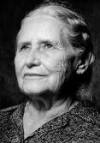
In memory of Nobel Prize winner Doris Lessing, who died this past Sunday, check out a Doris Lessing Vocabulary List drawn from a New York Review of Books piece on Lessing by the late critic John Leonard.
In the guise of reviewing her 2006 essay collection Time Bites: Views and Reviews and novel The Story of General Dann and Mara’s Daughter, Griot and the Snow Dog, Leonard gives a nice overview of Lessing's life and her major works and sheds light on her sometimes fractious engagement with critics and readers. With this review as a starting point, you can decide whether Lessing is for you and what period of her career might suit you best.
Leonard's piece includes four excerpts from her writing:
It is as if some gauze or screen has been dissolved away from life, that was dulling it, and like Miranda you want to say, What a brave new world! You don’t remember feeling like this, because, younger, habit or the press of necessity prevented. You are taken, shaken, by moments when the improbability of our lives comes over you like a fever. Everything is remarkable, people, living, events present themselves to you with the immediacy of players in some barbarous and splendid drama that it seems we are part of. You have been given new eyes.
—Doris Lessing, Time BitesI believe that the chief gift from Africa to writers, white and black, is the continent itself, its presence which for some people is like an old fever, latent always in their blood; or like an old wound throbbing in the bones as the air changes. That is not a place to visit unless one chooses to be an exile ever afterwards from an inexplicable majestic silence lying just over the border of memory or of thought. Africa gives you the knowledge that man is a small creature, among other creatures, in a large landscape.
—Doris Lessing, Preface to African StoriesI was seeing a mature woman, a woman who has had her fill of everything, but is still being asked from, demanded of, persuaded into giving: such a woman is generous indeed; her coffers and wells are always full and being given out. She loves—oh, yes, but somewhere in her is a deadly weariness. She has known it all, and doesn’t want any more—but what can she do? She knows herself—the eyes of men and boys say so—as a source; if she is not this, then she is nothing. So she still thinks—she had not shed that delusion. She gives. She gives. But with this weariness held in check and concealed.
—Doris Lessing, The Memoirs of a SurvivorDuring that space of time (which was timeless) she understood quite finally her smallness, the unimportance of humanity. In her ears was an inchoate grinding, the great wheels of movement, and it was inhuman…and no part of that sound was Martha’s voice.
—Doris Lessing, Martha Quest

